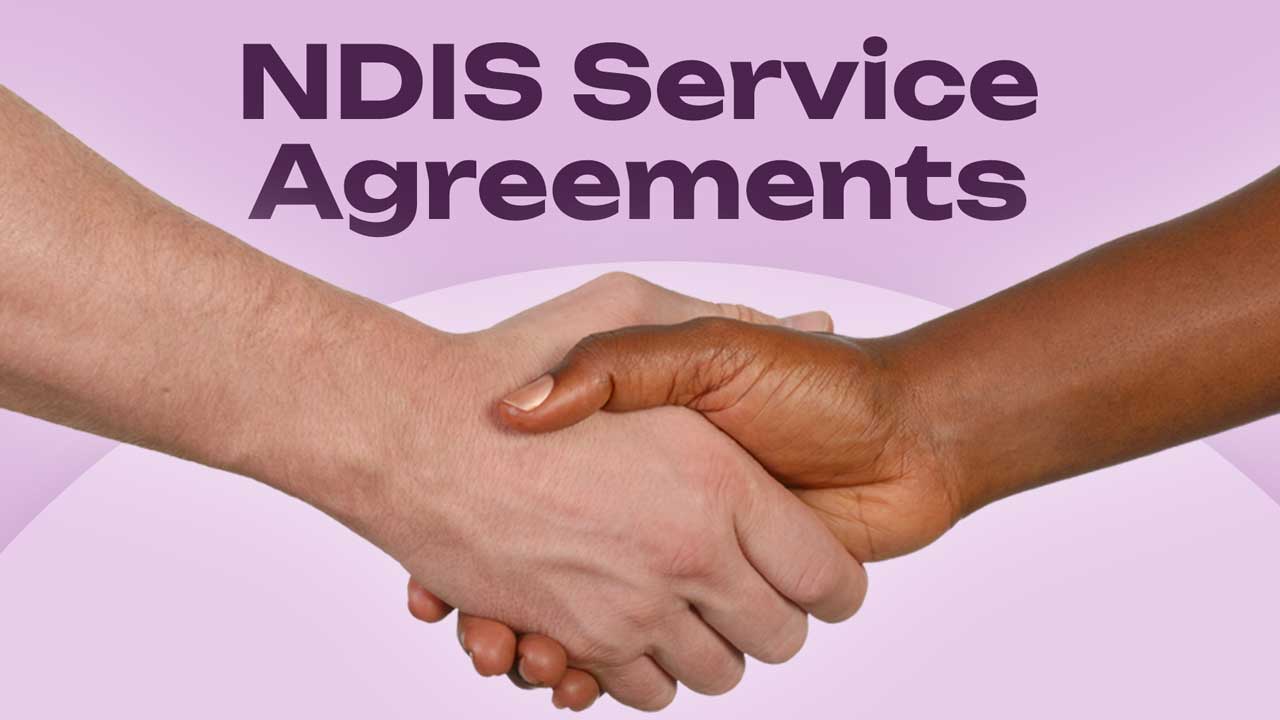A service agreement is a contract between a provider and an NDIS participant, which states the terms of the agreement between the two parties. Service agreements are covered under Australian Consumer Law (NDIA 2024).
Note that a service agreement is not the same as an NDIS support plan. While a support plan outlines the participant’s goals, a service agreement represents a negotiation between the provider and participant and sets out the specific services that the participant will receive (Disability Support Guide 2021).
Service agreements are not mandatory under the NDIS (unless the participant requires Specialist Disability Accommodation (SDA) supports) but are recommended (NDIA 2024).
Service agreements have several benefits, including:
- Protecting both the provider and participant from legal liability in the event that something goes wrong
- Formalising the relationship between the provider and participant
- Ensuring that the provider and participant have the same expectations
- Ensuring that the terms of the agreement between the provider and participant are legally binding.
(Disability Support Guide 2021)

Service Agreements in the NDIS Practice Standards
Service agreements are a requirement of the NDIS Practice Standards under Core Module 3: Provision of Supports.
This Practice Standard aims to ensure that NDIS participants clearly understand what supports they have chosen and how they will be delivered (NDIS 2021).
Service Agreement Quality Indicators
NDIS providers must meet the following quality indicators:
Development of the Service Agreement
The service agreement should be developed collaboratively between the provider and the participant to meet the participant’s individual circumstances, needs, and preferences (WAAMH 2021). Broadly speaking, the service agreement should outline:
- An explanation of the supports being delivered
- The expectations of the provider and participant
- Any conditions attached to the delivery of supports, and the rationale of these conditions.
(NDIS 2021)
What Exactly Should a Service Agreement Include?
The National Disability Insurance Agency (NDIA) lists the following considerations to help providers and participants decide what should be included in their service agreement.
Note that this is not a template and is not intended to replace an actual agreement.
| Consideration | Examples |
|---|---|
| Supports being provided |
|
| Costs |
|
| Provider and participant responsibilities |
|
| Service agreement |
|
| Dispute resolution process |
|
(NDIS 2020)
Inappropriate Service Agreements
The Office of the Public Advocate (2019) has identified the following areas of concern where service agreement provisions may be ‘onerous and unfair’:
- Anti-competitive matters
- Assignment
- Complaints
- Description of services
- Financial
- Improper signing of agreements
- Indemnity and liability
- Negotiations
- Personal responsibilities.
More information about these areas of concern can be found in NDIS Service Agreements: Making Choice and Control More Real by the Office of the Public Advocate.
Understanding the Service Agreement
The participant should be supported to properly understand their service agreement. Providers should take into account:
- The participant’s preferred language
- The participant’s preferred method of communication
- The participant’s preferred format of communication
- Terminology that the participant is most likely to understand.
(NDIS 2021; WAAMH 2021)
Strategies for supporting the participant to understand their service agreement include:
- Giving the participant enough time to understand the agreement and access any required supports
- Answering the participant’s questions
- Developing an easy-read version of the agreement for the participant
- Engaging interpreters or translators if required.
(WAAMH 2021)
Providing a Copy of the Agreement

If the service agreement is in writing, the participant should receive a copy signed by both the provider and the participant (NDIS 2021).
If it is not practical to provide the participant with a written copy or the participant does not wish to receive a copy, the circumstances and reasons surrounding this decision should be documented in the participant’s records (WAAMH 2021).
Supported Independent Living (SIL) Support in Specialist Disability Accommodation (SDA)
Note: This Quality Indicator is not relevant to every provider.
Providers that deliver supported independent living (SIL) support in specialist disability accommodation (SDA) settings should have a documented service agreement in place between the provider, the SDA provider, and every participant receiving supports (WAAMH 2021).
The service agreement should outline the parties responsible and their roles for the following matters:
- The way in which participants’ concerns about the dwelling are communicated and addressed
- The way in which conflicts involving participants are managed
- The way in which changes to participant circumstances and/or support needs are agreed upon and communicated
- The way in which vacancies will be filled in shared living settings, including participants’ rights to have their needs, preferences and situations taken into account during this process
- The way in which behaviours of concern that may put tenancies at risk are managed, if applicable.
(NDIS 2021
Test Your Knowledge
Question 1 of 3
True or false: Service agreements are protected by law.
Topics
References
- Disability Support Guide 2021, NDIS Service Agreements: What Are They and Do I Need One?, Disability Support Guide, viewed 29 July 2024, https://www.disabilitysupportguide.com.au/information/article/service-agreements
- National Disability Insurance Agency 2024, Making a Service Agreement, Australian Government, viewed 26 July 2024, https://www.ndis.gov.au/participants/working-providers/making-service-agreement
- NDIS Quality and Safeguards Commission 2021, NDIS Practice Standards: NDIS Practice Standards and Quality Indicators, Australian Government, viewed 29 July 2024, https://www.ndiscommission.gov.au/sites/default/files/2024-05/ndis-practice-standards-and-quality-indicatorsfinal1_1.pdf
- NDIS Quality and Safeguards Commission 2020, Things to Consider When Making a Service Agreement, Australian Government, viewed 29 July 2024, https://www.ndis.gov.au/participants/working-providers/making-service-agreement
- Office of the Public Advocate 2019, NDIS Service Agreements: Making Choice and Control More Real, Victoria State Government, viewed 29 July 2024, https://www.publicadvocate.vic.gov.au/opa-s-work/research/108-ndis-service-agreements-making-choice-and-control-more-real
- Western Australian Association for Mental Health 2021, Readiness Workbook: NDIS Practice Standards & Quality Indicators, WAAMH, viewed 29 July 2024, https://waamh.org.au/assets/documents/sector-development/ndis-qsc-sector-readiness/waamh-ndis-readiness-workbook-interactive-final-1-.pdf
 New
New 
